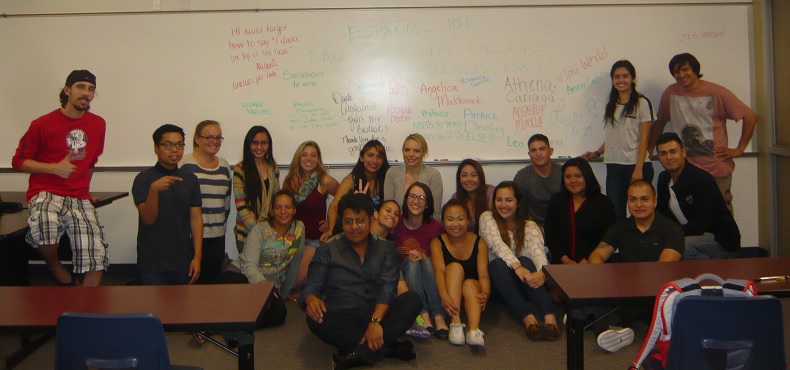
version: 3-10
On December 12, 2017, three San Diego City College adjunct professors filed a lawsuit in federal court to address long-term abuses by their Chair and Dean. The complaints included discrimination, intimidation, and retaliatory class scheduling. The discrimination was based on race, age, socioeconomic class, and of course — being an adjunct. The three adjuncts, Salvador Gonzalez, David Becerra, and Antonio Jimenez are faculty members respected by their peers and students. Their chair threatened them if they spoke out, and punished them with bad class assignments. The retaliatory class scheduling included assigning these adjuncts classes with a high chance of being cancelled because of low enrollment, classes at inconvenient times, and the creation of a Frankenstein “split class” where two adjuncts were assigned half a class, each teaching half of the period. Their complaints are the tip of the iceberg: other adjuncts in the City College Language Department have similar complaints, and this fits the general pattern of abuse of power against adjuncts in the San Diego Community College District (SDCCD), and the nation. The current lawsuit names the Chair of the Language Department, Rosalinda Sandoval, and the Dean, Trudy Gerald. The president of the teachers’ union, Jim Mahler, was implicated in colluding with the abuse. The lawsuit will be served in March, and a federal Equal Employment Opportunity Commission (EEOC) complaint is pending.
What can adjuncts do when their bosses and representatives sell them out? Fight back! Change only happens when we speak out. The San Diego Adjunct Faculty Association (SDAFA) asks that you sign the online petition to remove Sandoval as Chair, and write letters of support on behalf of the City College language adjuncts. If you have suffered similar abuse please contact SDAFA and we can help point you to legal resources.
Racism
Starting in 2010, Professor Gonzalez realized that Rosalinda Sandoval was racist and would use the power of her position as Chair to make life miserable for adjuncts. She insulted him based on his skin color and origins in Mexico City, and continued with a series of racist insults: chilango prieto, mosca prieta, and Elvis Mexicano prieto. Chilango is an ethnic slur for people from Mexico City. Prieto is a derogatory racial term for “dark skinned” and can approach the offensiveness of the “N-word” in many contexts. Mosca means “house fly”.
Racism is not limited to White against Black. Though most of our struggle is dealing with white people who discriminate against people with Mexican heritage, Mexico itself has a long history of internal racism, where lighter skinned Europeos discriminated against darker skinned Indios, Negros, and a series of mixed castes. Race is a fluid social construct and there are times that racial terms can be used within a group without oppression, such as to reclaim the term, as a joke, or as a term of endearment, but this was not the case. Calling someone a “black fly” is blatant racism in any context or interpretation, especially by a supervisor.
Ageism
The lawsuit shows that Rosalinda Sandoval also discriminated against adjuncts based on their age. Sandoval referred to David Becera as a ruco, a condescending term equivalent to “old fart”, and viejito or “little old man”. These were said in aggressive contexts meant to belittle the adjuncts. During a Language Day Celebration where the adjuncts were volunteering their time, Sandoval again made “derogatory, discriminating, disparaging and harassing comments” about the age of Antonio Jimenez in front of students.
Ageism, discrimination based on age, is a concern for adjuncts who don’t catch the “brass ring” and become full-time professors early in their careers. There is evidence that suggests after more than a few years as an adjunct, your chances of getting a full-time job actually go down. An increasing number of adjuncts are being forced to collect their small retirement checks as soon as possible, and then continue teaching to pay monthly bills. The case of Margaret Mary Votjko galvanized adjuncts in 2013 as an example of a professor who was thrown out on the street to die by the university she dedicated her life to. As with most forms of discrimination, ageism is difficult to prove without direct evidence. But, this lawsuit cites several instances where Rosalinda Sandoval failed to hide her contempt for the age of the adjuncts under her supervision.
Classism
The lawsuit also mentions discriminatory actions based on socio-economic class. In 2014, when Sandoval told Becerra to “get new clothes”, she was making $143,181.02 in salary and benefits, while Becerra was making $32,706.18 (TransparentCalifornia.com). Factoring in both Sandoval’s extra work (more classes) and benefits (pro-rata retirement, sabbaticals), Sandoval is making over twice as much for the same work. This is a typical ratio between adjuncts and full-timers, and “Equal Pay for Equal Work!” is a long-standing demand of the adjunct movement. SDAFA works with several adjunct professors at San Diego City College currently living under the poverty line, some who are homeless, some who are getting food stamps. Statewide surveys suggest that around a quarter of all adjuncts receive some kind of public assistance.
San Diego City College prides itself on a commitment to social justice, so how do progressive-leaning administrators and full-time professors rationalize exploiting their adjunct colleagues? Scapegoating is common tactic in our economic system; blame the victim of an oppressive economy for factors beyond their control; the plight of the adjunct is their own fault because they are not dressing for success. Adjunctivication is the system perfected over the last forty years to extract the surplus value of adjunct labor and move it up the hierarchy: from the adjuncts who teach most of the students, to full-timers, administrators, and union bosses, through a slew of failed initiatives at the expense of those on the bottom: the adjuncts and the students. How would you respond to a Chair who criticized the way you dressed? Try saying: “Fine, I’ll buy some new clothes as soon as you start paying me what I’m worth.”
Tenurism
The common thread of discrimination by Rosalinda Sandoval and Trudy Gerald against all the language adjuncts was based on employment status. We are tempted to hold academia to a higher standard of social justice than the corporate workplace, but for all the Marxist rhetoric and socialist leanings of academia, these Orwellian hypocrites draw a line in the sand when it comes to having their own power and privilege challenged. This complaint mentions discrimination based on race, ethnicity, age, and class. But the most salient way Sandoval and Gerald ranked people can be best understood as “tenurism”, a term coined by Keith Hoeller to describe the discrimination of adjuncts by their full-time colleagues and administrators. Hoeller defines tenurism as a form of discrimination that “categorizes people by their tenure status and makes the false assumption that tenure (or the lack of it) somehow defines the quality of the professor.”
The racism, ageism, and classism are exacerbated by the power differential between Dean, Chair, and adjunct. The abusers wield a magic wand every semester that determines who is rehired and what teaching schedule they are offered. Deans and Chairs are fully aware that most adjuncts (freeway flyers) are forced to teach at several campuses, so the last minute changes in their usual schedule will likely mean they are unable to accept that class due to a prior commitment. Retaliatory scheduling is tool for the tenured to punish adjuncts they don’t like.
The City College administration and San Diego Community College District have defended Chair Sandoval and Dean Gerald against the charges of the discrimination, retaliation, and abuse of power. Management typically invokes the right of the supervisor to fire bad employees. But, these three adjuncts are excellent professors. They have the proper degrees, training, awards, and years of experience. When students enroll in their classes they have no way of knowing most of their professors are paid half as much, and insulted by their supervisors. Student testimonials are subjective, but still give a feel for the amazing job these adjuncts are doing.

Amber Dodge, one of Salvador Gonzalez’s students said:
“He definitely has a passion for teaching. Does everything he can to help you succeed. He is very fair to all the students. It comes across immediately that he genuinely cares about the students. He puts a lot of effort into his curriculum and shows dedication. He is constantly striving to keep the students engaged. He integrates games, and other activities to make the class enjoyable. He is intuitive about the needs of the students. He is passionate and dedicated. He cares about learning.”

Daniel Wing, another of Salvador Gonzalez’s students said:
“Great teacher! Very passionate about the subject and he relates very well to students. Really wants people to learn. His only lament was for the students who were just there for a letter grade. As much as any professor I’ve had, he is concerned with learning. He has a unique and interesting way of sharing how he learned English, as a way to encourage and motivate students to learn Spanish. Very well prepared. Always a step ahead of the class.”
Linda Rodriguez, one of David Becerra’s former students, said:
“He is very patient, he answers questions. He made us feel comfortable. I wanted to learn grammar, and he would take the extra time if I needed help writing something. He would explain it over and over until I got it. He was really pleasant, he tells jokes. We felt relaxed. So when we did presentations, speaking in front of the rest of the class it wasn’t nerve wracking, it was comfortable. He was thorough. He had packets for each chapter to help us study. Spanish 201 was more intense, and it seemed like a lot of work, but it really helped me learn. I was better at speaking, so he put me into groups where I could help other students with their pronunciation. The class felt like we were all participating.”


Update at https://www.sdafa.org/strike-two/
Es una vergüenza que gente como Rosalinda Sandoval trabaje en una institución educativa. debe ser removida de su cargo inmediatamente, y se deben tomar medidas para que esto no pase otra vez. Nos estamos enfrentando a un período largo de racismo y violencia verbal con este nuevo presidente de la nación, no necesitamos la misma situación a menor escala, en nuestro lugar de trabajo, y viniendo de personas con nuestro mismo bagaje cultural, es mucho peor. Exijo que Rosalinda Sandoval sea removida de su cargo.
¡Gracias Cynthia!